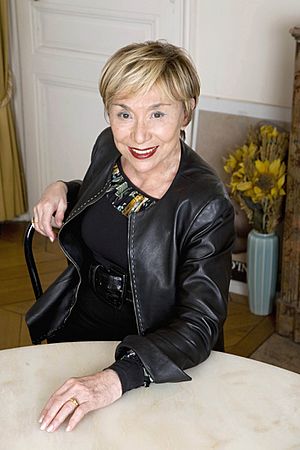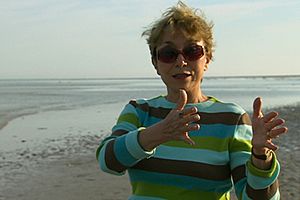Julia Kristeva facts for kids
Quick facts for kids
Julia Kristeva
|
|
|---|---|

Kristeva in 2008
|
|
| Born |
Yuliya Stoyanova Krasteva
24 June 1941 Sliven, Kingdom of Bulgaria
|
| Alma mater | University of Sofia |
| Spouse(s) | Philippe Sollers |
| Awards |
|
| Era | Contemporary philosophy |
| Region | Western philosophy |
| School |
|
|
Main interests
|
|
Julia Kristeva (born on June 24, 1941) is a famous Bulgarian-French thinker, writer, and psychoanalyst. She moved to France in the 1960s and has become one of the most important voices in modern philosophy, cultural studies, and feminism.
Kristeva has written over 30 books on topics like language, art, and the human mind. Her work explores how we use language and how our earliest experiences shape who we become. She has received many major awards for her ideas, including the Holberg International Memorial Prize. She is also known for her novels and for founding the Simone de Beauvoir Prize committee, which honors people who work for women's freedom.
Contents
Life and Education
Julia Kristeva was born in Sliven, Bulgaria. As a child, she attended a French-language school. This early education helped her become familiar with French culture and ideas. She later studied at the University of Sofia.
In 1965, at the age of 24, she won a research fellowship that allowed her to move to Paris, France. There, she studied with some of the most famous thinkers of the time, like Roland Barthes. In 1967, she married the novelist Philippe Sollers. Kristeva also taught at Columbia University in New York City and is now a professor emerita (a retired professor who keeps her title) at the Université Paris Cité.
Kristeva's Big Ideas
Kristeva's work combines philosophy, psychoanalysis (the study of the unconscious mind), and literary criticism. She is known for developing new ways to think about language, identity, and society.
The Semiotic and the Symbolic
One of Kristeva's most famous ideas is that our ability to communicate has two parts: the semiotic and the symbolic.
- The semiotic is our first experience of the world, before we can speak. Think of a baby who communicates through sounds, rhythms, and feelings. This is a world of emotions and instincts, connected to the mother's body. It's a creative and poetic space that exists before rules and grammar.
- The symbolic is the world of language, laws, and social rules that we enter as we grow up. When a child learns to say "I" and understands they are a separate person from their mother, they enter the symbolic realm. This is where we share meaning with others through structured language.
Kristeva believed that we are always moving between these two worlds. Even as adults, the creative, emotional power of the semiotic can burst through in art, music, and poetry.
Abjection: Becoming a Self
To enter the symbolic world of language, a child must separate from their mother. Kristeva calls this process abjection. It means to reject or push away something. To form our own identity, we must push away the state of being completely connected to our mother.
This creates a boundary between "me" and "not-me." Kristeva suggested that this process can be both necessary and scary. She argued that some scary movies tap into this fear. They show things that remind us of this early, messy separation, which is why we can be both fascinated and horrified by them.
The Chora: A Nurturing Space
Kristeva also used the ancient Greek idea of the chora to describe the special bond between a mother and her child before birth and in early infancy. She saw it as a nourishing, rhythmic, and protective space. The chora is where the semiotic comes from. It's a "maternal space" that exists before the child develops a separate identity.
Kristeva and Feminism
Kristeva is considered a major figure in French feminism. However, her relationship with the feminist movement has been complex. She challenged some common feminist ideas of her time.
She described three "generations" of feminism. She was critical of movements that focused too much on creating a single, "unified" female identity. Kristeva argued against what is sometimes called "identity politics," where a person's group identity (based on gender, ethnicity, etc.) is seen as more important than their individual self. She believed that focusing too much on group identity could be limiting and that each person's unique experiences are what truly matter.
Work as a Novelist
Besides her philosophical work, Kristeva is also a novelist. She has written several novels that are like detective stories but are filled with deep psychological and philosophical ideas.
Her characters are often complex and explored through their thoughts and feelings. Her novels, like Murder in Byzantium and The Old Man and the Wolves, mix suspenseful plots with the same themes found in her non-fiction work.
Honors and Recognition
Julia Kristeva has been honored around the world for her groundbreaking work.
- In 2004, she received the Holberg International Memorial Prize for her "innovative explorations" of language, culture, and literature.
- In 2006, she won the Hannah Arendt Prize for Political Thought.
- She has been named a Commander in two of France's highest orders: the Legion of Honor and the Order of Merit.
Bulgarian State Security Allegations
In 2018, a government commission in Bulgaria stated that during the country's communist era, Kristeva had been an agent for the state security services under the code name "Sabina." This was said to have happened after she moved to France in the 1960s.
Kristeva has strongly denied these accusations, calling them "grotesque and false." Some writers and historians have looked at the files and suggested that the information she shared was mostly harmless gossip about other intellectuals in Paris. They argue that the intelligence value of her reports was almost zero.
Selected Writings
Kristeva has written many influential books. Here are a few of her most famous works translated into English:
- Revolution in Poetic Language
- Powers of Horror: An Essay on Abjection
- Tales of Love
- Black Sun: Depression and Melancholia
- Strangers to Ourselves
- Female Genius (a three-volume series on Hannah Arendt, Melanie Klein, and Colette)
See also
 In Spanish: Julia Kristeva para niños
In Spanish: Julia Kristeva para niños


